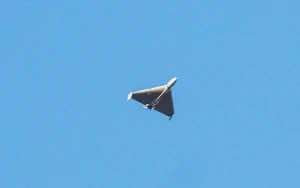
“Russia will not tolerate”: Zakharova's reaction to Rasmussen's proposal
NATO Ex-Secretary Anders Fogh Rasmussen suggested an unconventional idea of immediately integrating the unoccupied part of Ukraine into the Alliance. Moscow has been contemplating what to say in response
"Lavrov's voice" Maria Zakharova, spokesperson for the Ministry of Foreign Affairs, finally expressed the much-awaited and unsurprising response: "We constantly clarify our position regarding Ukraine's accession to NATO... In parts or without any parts, in any form, Ukraine's accession to the Atlantic bloc is unacceptable for Russia."
It seems Zakharova overlooked that nobody asked her or her superiors' opinions on what Kyiv should or shouldn’t do, whether to engage partially or entirely, or in what form. Since February 24, 2022, all such inquiries and answers have become, to put it lightly, inappropriate and harmful.
Read also: Former NATO chief proposes Ukraine joins without Russian-occupied territories
Rasmussen's proposal is noteworthy for two reasons. Firstly, it admittedly comes from an unofficial person, yet a person well-versed in the workings of the Alliance, likely consulting military and political experts before voicing the idea. Secondly, the Netherlands' Defense Minister, Kajsa Ollongren, endorsed Rasmussen's suggestion in a meeting with fellow defense heads in Brussels, stating that she really “welcomes such a creative idea.”
Read also: Ukraine in NATO now: risks and scenarios
I can't say for certain, but German President Frank-Walter Steinmeier, known to Ukrainians for his somewhat questionable "reconciliation" formula from 2015, seemed to echo a similar sentiment. Back then, Steinmeier's approach faced well-deserved criticism. However, it appears that the new reality, marked by Russia's full-scale aggression, compelled him to reconsider his stance. Now he states directly: "Ukraine needs our support even more now, with the war in the Middle East drawing attention away from the war in Ukraine, which desperately needs international attention. Putin is banking on the world forgetting about Ukraine... We won't tolerate Russia's illegal and aggressive war."
This position is encouraging and suggests that Rasmussen has identified a key element around which a comprehensive plan for Kyiv's Euro-Atlantic integration can be developed. There's a clear understanding that a prolonged and static conflict will not only wear down Ukraine but also its allies.
Most importantly, there's no talk of surrendering temporarily occupied territories. It's mentioned that under NATO protection—which Russia is unlikely to challenge—Ukraine can not only secure proper and safe logistics for its Armed Forces but also manufacture the necessary weapons and ammunition for the eventual liberation of these areas. Meanwhile, sanctions against Moscow will deplete its resources.
I'm not even mentioning the foreseeable impact on Russia itself due to Ukraine's likely unexpected change in status. Many Russian citizens, influenced by Putin's propaganda, will witness that the Kremlin's ill-conceived “special military operation” led to an opposite outcome. With NATO approaching Russia's doorstep, Putin is squarely responsible.
Rasmussen's proposal is relevant regarding the political future of allied nations. The Kremlin openly anticipates Trump's potential victory in the 2024 US presidential elections. If, God forbid, Trump returns to the White House, Ukraine is unlikely to receive aid from the US. The MAGA slogan creator has already declared the end of the partnership, the reclamation of America's wealth, and expects European allies to cover Ukraine's costs. Trump's populist and isolationist team, aligned with Putin, has long questioned the Alliance's necessity. Thus, NATO might not even consider expansion during Trump's tenure.
Zakharova's neurotic response suggests one thing: the former Alliance Secretary General's proposal is gaining traction. Now, it's up to Kyiv and Ukrainian authorities to actively discuss and promote this idea internationally, through embassies and government channels. Unfortunately, so far, we've only heard rhetorical questions from Mykhailo Podolyak, the adviser to the head of the President’s Office, and nothing else.
Specially for Espreso.
About the author. Ihor Hulyk, journalist.
The editors do not always share the opinions expressed by the blog authors.
- News














































